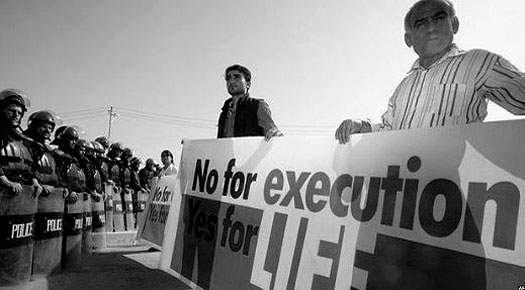
Amnesty International recently warned that there has been a shocking spike in the number of executions of religious minorities in Iran. According to its records, as many as 696 people have been killed from January 1 to July 15 this year even though the country’s authorities have officially reported only one third that figure. In contrast, 2014 witnessed 743 people being executed in the entire year even though authorities confirmed only 289 of those killings.
The human rights group said the spike is disturbing since the deaths have been imposed by courts that are thoroughly lacking in independence and impartiality.
“They are imposed either for vaguely worded or overly broad offences, or acts that should not be criminalized at all, let alone attract the death penalty,” it said. “Trials in Iran are deeply flawed, detainees are often denied access to lawyers, and there are inadequate procedures for appeal, pardon and commutation.”
As of July 15, 2015, Iranian authorities have acknowledged 246 judicial executions but Amnesty International found data supporting 448 additional killings. It also said that on an average, almost three executions are being carried out each day.
“Iran's staggering execution toll for the first half of this year paints a sinister picture of the machinery of the state carrying out premeditated, judicially-sanctioned killings on a mass scale,” said Said Boumedouha, deputy director of Amnesty's Middle East and North Africa program. “The use of the death penalty is always abhorrent, but it raises additional concerns in a country like Iran where trials are blatantly unfair.”
While Amnesty was unable to pinpoint the reason behind this sudden surge in executions, it said that most of those killed had been convicted of various drug charges.
“The [Iranian] authorities have confirmed that around 80% of executions are for these [drugs] offences,” Amnesty researcher Raha Bahreini told the media.
The anti-narcotics law in Iran provides obligatory death sentences for a number of drug-related offences, including the trafficking of over 5 kilograms of narcotics obtained from opium or over 30 grams of morphine, heroin, cocaine and other opiate derivatives. Amnesty International argues, however, that this law is in violation with international laws that restrict the use of death penalty for more serious crimes.
“For years, Iranian authorities have used the death penalty to spread a climate of fear in a misguided effort to combat drug trafficking, yet there is not a shred of evidence to show that this is an effective method of tackling crime,” Boumedouha said.
Among those executed this year were some who belonged to different religious and ethnic minorities. Most of these minorities, including a few Sunni Muslims and some Kurdish political prisoners, were convicted on grounds of causing corruption on earth and waging enmity against God. Amnesty International warned that several thousand people are currently on death row in Iran and in most cases, they would be notified of their execution only a few hours beforehand. Their families would, in all likelihood, be informed days, if not weeks, later.
Photo Credits: BBC
